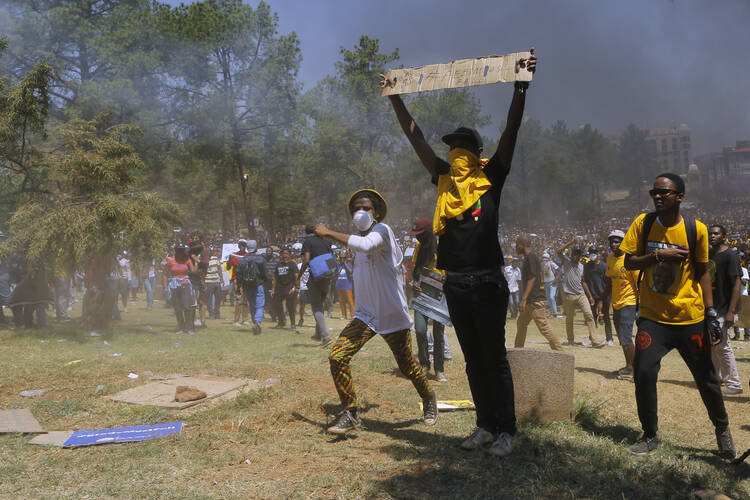South African church leaders urged university students who won a government commitment to a tuition freeze in 2016 to return to the classroom and said they will help find solutions to the country's mounting education crisis.
President Jacob Zuma announced tuition would hold steady in 2016 in response to student protests that began Oct. 13 at the University of the Witwatersrand in Johannesburg and spread to other campuses nationwide.
The "financial precariousness of most students should not be an obstacle to accessing education," said the national executive of the South African Council of Churches, of which the Southern African Catholic Bishops' Conference is a member.
After an Oct. 29 meeting in Johannesburg, the council members said they will meet with students, university management, government and the private sector to discuss ways of ensuring equitable access to university education.
The church leaders said they recognize the importance of the campaigns "in defense of poor families caught in the crosshairs of spiraling costs of university education."
But "violent acts and wanton destruction of university property by some rogue elements at some campuses" are of great concern and "have no place in democratic processes of an open society," they said.
The protests, marked by some running battles between students and police, included a march on parliament in Cape Town and another on the Union Buildings, the seat of government in Pretoria.
Offices of the bishops' conference have addressed the need for education reform.
"In celebrating the achievements of university students who have successfully brought their grievances to the attention of government, we must not fail to hear the voices that are less articulate," Mike Pothier, research coordinator Parliamentary Liaison Office of the bishops' conference, told Catholic News Service Oct. 30.
"The government has been galvanized by this mini-uprising to find more funds for tertiary education, but there is a danger that the interests of the millions of young South Africans who have been completely let down by the education system will be overlooked," Pothier said.
"We need to ensure that there is not a competing set of interests in education" budgets, he added, noting that children in rural areas often lack transport to get to the nearest primary school.
While no "academically worthy young South African should be denied the opportunity to study at higher education level because of their financial situation, or that of their family," there are competing needs for funding, the Department of Catholic Social Action of the bishops' conference said in a statement.
More than 20 years after apartheid officially ended in South Africa, "the majority of adults are still not in a financial position to pay income tax, many universities are in serious financial difficulty and there are numerous equally valid and urgent demands on the public purse -- from housing, to health to quality schooling," the statement said.
The state's student loan program should be expanded and improved, it said, while noting the need for an increase in the proportion of black and female professors at South Africa's universities.
At an Oct. 23 meeting in Johannesburg, religious leaders, including Archbishop Jabulani Nxumalo of Bloemfontein, offered to help find lasting solutions to what they described as an education crisis.
Noting that most students are unable to afford university tuition are black, which "entrenches inequality," the leaders called on university administrators, the government and students to seek lasting solutions through "dialogue, listening and courageous action."








